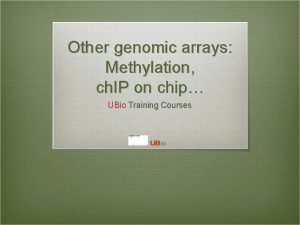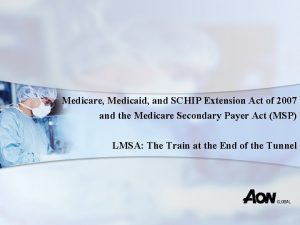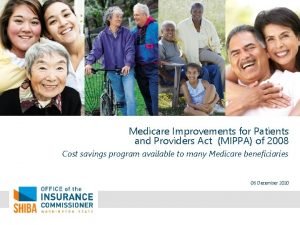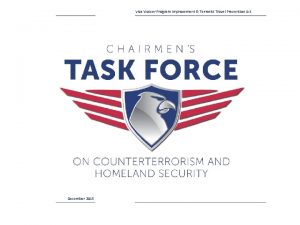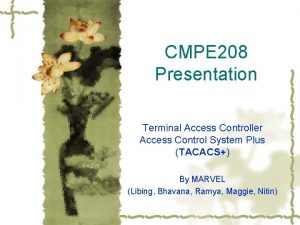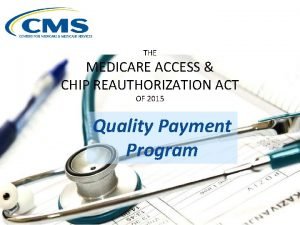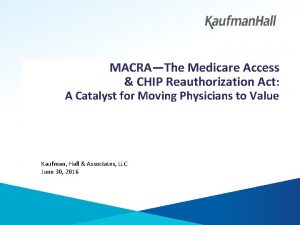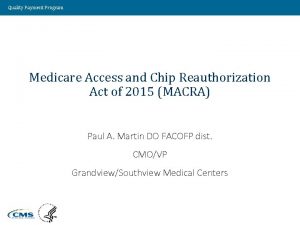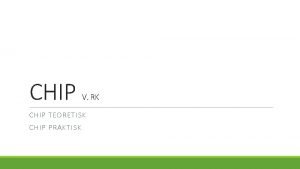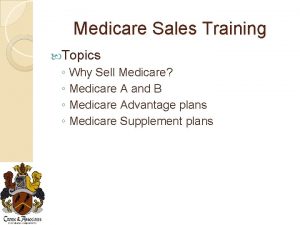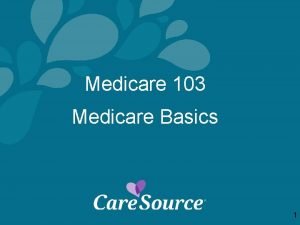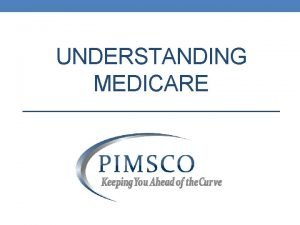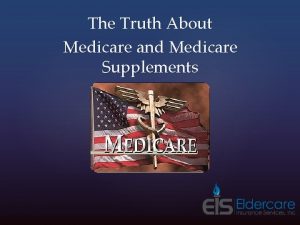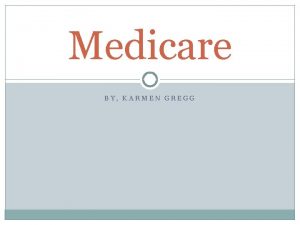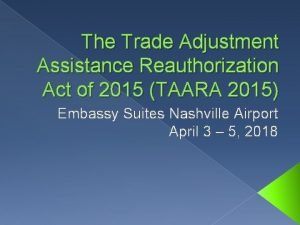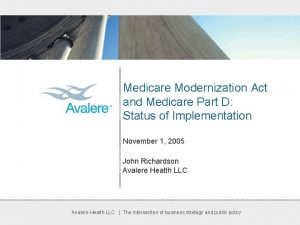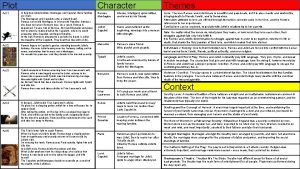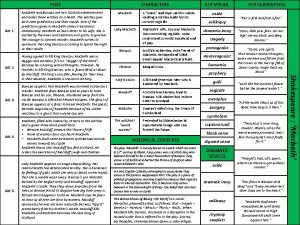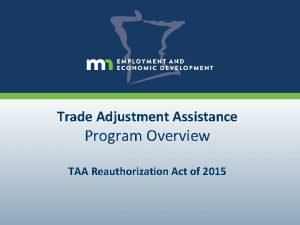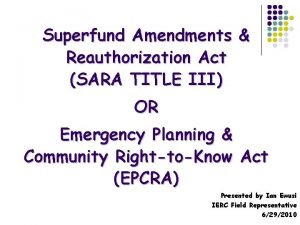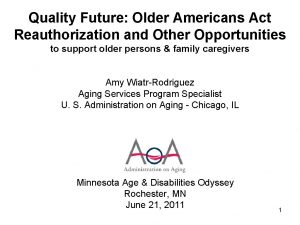The Medicare Access Chip Reauthorization Act of 2015





























- Slides: 29

The Medicare Access & Chip Reauthorization Act of 2015 QUALITY PAYMENT PROGRAM

KEY TOPICS: 1) The Quality Payment Program 2) The Merit-based Incentive Payment System (MIPS) 3) Incentives for Participation in Advanced Alternative Payment Models (Advanced APMs) 4) What are the next steps? 2

Quality Payment Program ü Repeals the Sustainable Growth Rate (SGR) Formula ü Streamlines multiple quality reporting programs into the new Merit-based Incentive Payment System (MIPS) ü Provides incentive payments for participation in Advanced Alternative Payment Models (APMs) The Merit-based Incentive Payment System (MIPS) o r Advanced Alternative Payment Models (APMs) ü First step to a fresh start ü We’re listening and help is available ü A better, smarter Medicare for healthier people ü Pay for what works to create a Medicare that is enduring ü Health information needs to be open, flexible, and user-centric 3

When and where do I submit comments? • The proposed rule includes proposed changes not reviewed in this presentation. We will not consider feedback during the call as formal comments on the rule. See the proposed rule for information on submitting these comments by the close of the 60 -day comment period on June 27, 2016. When commenting refer to file code CMS-5517 -P. • Instructions for submitting comments can be found in the proposed rule; FAX transmissions will not be accepted. You must officially submit your comments in one of the following ways: electronically through • Regulations. gov • by regular mail • by express or overnight mail • by hand or courier • For additional information, please go to: http: //go. cms. gov/Quality. Payment. Program 4

MIPS: First Step to a Fresh Start ü MIPS is a new program • Streamlines 3 currently independent programs to work as one and to ease clinician burden. • Adds a fourth component to promote ongoing improvement and innovation to clinical activities. a 2 Quality ü Resource use Clinical practice improvement activities : Advancing care information MIPS provides clinicians the flexibility to choose the activities and measures that are most meaningful to their practice to demonstrate performance. 5

Who Will Participate in MIPS? Affected clinicians are called “MIPS eligible clinicians” and will participate in MIPS. The types of Medicare Part B eligible clinicians affected by MIPS may expand in future years. Years 3+ Years 1 and 2 Secretary may broaden Eligible Clinicians group to include others such as Physicians (MD/DO and DMD/DDS), PAs, NPs, Clinical nurse specialists, Certified registered nurse anesthetists Physical or occupational therapists, Speech-language pathologists, Audiologists, Nurse midwives, Clinical social workers, Clinical psychologists, Dietitians / Nutritional professionals 6

Who will NOT Participate in MIPS? There are 3 groups of clinicians who will NOT be subject to MIPS: 1 FIRST year of Medicare Part B participation Below patient volume threshold Certain participants in ADVANCED Alternative Payment Models Medicare billing charges less than or equal to $10, 000 and provides care for 100 or fewer Medicare patients in one year Note: MIPS does not apply to hospitals or facilities 7

Note: Most clinicians will be subject to MIPS. ct to e j b Su MIPS Not in APM In non-Advanced APM In Advanced APM, but not a QP Note: Figure not to scale. QP in Advanced APM Some people may be in Advanced APMs but not have enough payments or patients through the Advanced APM to be a QP. 8

PROPOSED RULE MIPS: Eligible Clinicians can participate in MIPS as an: Or Individual Group A group, as defined by taxpayer identification number (TIN), would be assessed as a group practice across all four MIPS performance categories. Note: “Virtual groups” will not be implemented in Year 1 of MIPS. 9

PROPOSED RULE MIPS: Performance Category Scoring Summary of MIPS Performance Categories Performance Category Maximum Possible Points per Performance Category Percentage of Overall MIPS Score (Performance Year 1 2017) Quality: Clinicians choose six measures to report to CMS that best reflect their practice. One of these measures must be an outcome measure or a high-value measure and one must be a crosscutting measure. Clinicians also can choose to report a specialty measure set. 80 to 90 points depending on group size 50 percent Advancing Care Information: Clinicians will report key measures of interoperability and information exchange. Clinicians are rewarded for their performance on measures that matter most to them. Clinical Practice Improvement Activities: Clinicians can choose the activities best suited for their practice; the rule proposes over 90 activities from which to choose. Clinicians participating in medical homes earn “full credit” in this category, and those participating in Advanced APMs will earn at least half credit. 100 points 25 percent 60 points 15 percent Cost: CMS will calculate these measures based on claims and availability of sufficient volume. Clinicians do not need to report anything. Average score of all cost measures that can be attributed 10 percent 10

PROPOSED RULE MIPS Performance Period 2: a ü All MIPS performance categories are aligned to a performance period of one full calendar year. ü Goes into effect in first year (2017 performance period, 2019 payment year). MIPS Performance Period (Begins 2017) 2017 Performance Period 2018 2019 2020 2021 2022 2023 2024 2025 Payment Year 11

PROPOSED RULE MIPS: Payment Adjustment ü A MIPS eligible clinician’s payment adjustment percentage is based on the relationship between their CPS and the MIPS performance threshold. ü A CPS below the performance threshold will yield a negative payment adjustment; a CPS above the performance threshold will yield a neutral or positive payment adjustment. ü A CPS less than or equal to 25% of the threshold will yield the maximum negative adjustment of -4%. 2 : a Quality Resource use Clinical practice improvement activities Advancing care information = MIPS Composite Performance Score (CPS) 12

PROPOSED RULE MIPS: Payment Adjustment ü A CPS that falls at or above threshold will yield payment adjustment of 0 to +12%, based on the degree to which the CPS exceeds the threshold and the overall CPS distribution. ü An additional bonus (not to exceed 10%) will be applied to payments to eligible clinicians with exceptional performance where CPS is equal to or greater than an “additional performance threshold, ” defined as the 25 th quartile of possible values above the CPS performance threshold. 2 : a Quality Resource use Clinical practice improvement activities Advancing care information = MIPS Composite Performance Score (CPS) 13

How much can MIPS adjust payments? Based on a MIPS Composite Performance Score , clinicians will receive +/- or neutral adjustments up to the percentages below. +9% +7% +4%+5% +/- Maximum Adjustments -4% -5% -7% -9% 2019 2020 2021 2022 onward Merit-Based Incentive Payment System (MIPS) Adjusted Medicare Part B payment to clinician The potential maximum adjustment % will increase each year from 2019 to 2022 14

INCENTIVES FOR ADVANCED APM PARTICIPATION 15

What is an Alternative Payment Model (APM)? APMs are new approaches to paying for medical care through Medicare that incentivize quality and value. ü CMS Innovation Center model (under ü MSSP (Medicare Shared Savings Program) ü Demonstration under the Health Care ü Demonstration required by federal law As defined by MACRA, APMs include: section 1115 A, other than a Health Care Innovation Award) Quality Demonstration Program 16

Advanced APMs meet certain criteria. As defined by MACRA, Advanced APMs must meet the following criteria: ü The APM requires participants to use certified EHR technology. ü The APM bases payment on quality measures comparable to those in the MIPS quality performance category. ü The APM either: (1) requires APM Entities to bear more than nominal financial risk for monetary losses; OR (2) is a Medical Home Model expanded under CMMI authority. 17

PROPOSED RULE Medical Home Models: ü Have a unique financial risk criterion for becoming an Advanced APM. ü Enable participants (who are not excluded from MIPS) to receive the maximum score in the MIPS CPIA category. A Medical Home Model is an APM that has the following features: ü Participants include primary care practices or multispecialty practices that include primary care physicians and practitioners and offer primary care services. ü Empanelment of each patient to a primary clinician; and ü At least four of the following: • Planned coordination of chronic and preventive care. • Patient access and continuity of care. • Risk-stratified care management. • Coordination of care across the medical neighborhood. • Patient and caregiver engagement. • Shared decision-making. • Payment arrangements in addition to, or substituting for, fee-for-service payments. 18

PROPOSED RULE Advanced APM Criterion 1: Requires use of CEHRT : Certified EHR use Example: An Advanced APM has a provision in its participation agreement that at least 50% of an APM Entity’s eligible clinicians must use CEHRT. APM Entity ü An Advanced APM must require at least 50% of the eligible clinicians in each APM Entity to use CEHRT to document and communicate clinical care. The threshold will increase to 75% after the first year. ü For the Shared Savings Program only, the APM may apply a penalty or reward to APM entities based on the degree of CEHRT use among its eligible clinicians. Eligible Clinicians 19

PROPOSED RULE Advanced APM Criterion 2: Requires MIPS-Comparable Quality Measures ü ü An Advanced APM must base payment on quality measures comparable to those under the proposed annual list of MIPS quality performance measures; ü No minimum number of measures or domain requirements, except that an Advanced APM must have at least one outcome measure unless there is not an appropriate outcome measure available under MIPS. Comparable means any actual MIPS measures or other measures that are evidence -based, reliable, and valid. For example: • Quality measures that are endorsed by a consensus-based entity; or • Quality measures submitted in response to the MIPS Call for Quality Measures; or • Any other quality measures that CMS determines to have an evidencebased focus to be reliable and valid. 20

PROPOSED RULE Advanced APM Criterion 3: Requires APM Entities to Bear More than Nominal Financial Risk An Advanced APM must meet two standards: Financial Risk Standard APM Entities must bear risk for monetary losses. Nominal Amount Standard & The risk APM Entities bear must be of a certain magnitude. ü The Advanced APM financial risk criterion is completely met if the APM is a Medical Home Model that is expanded under CMS Innovation Center Authority ü Medical Home Models that have not been expanded will have different financial risk and nominal amount standards than those for other APMs. 21

Proposed Rule Advanced APMs Based on the proposed criteria, which current APMs will be Advanced APMs in 2017? ü Shared Savings Program (Tracks 2 and 3) ü Next Generation ACO Model ü Comprehensive ESRD Care (CEC) (large dialysis organization arrangement) ü Comprehensive Primary Care Plus (CPC+) ü Oncology Care Model (OCM) (two-sided risk track available in 2018) 22

How do I become a Qualifying APM Participant (QP)? Advanced APM QP You must have a certain % of your patients or payments through an Advanced APM. Be excluded from MIPS QPs will: Receive a 5% lump sum bonus Bonus applies in 2019 -2024; then QPs receive higher fee schedule updates starting in 2026 23

PROPOSED RULE How do Eligible Clinicians become QPs? Eligible Clinicians to QP in 4 STEPS Eligible Clinicians QP 1. QP determinations are made at the Advanced APM Entity level. 2. CMS calculates a “Threshold Score” for each Advanced APM Entity. 3. The Threshold Score for each method is compared to the corresponding QP threshold. 4. All the eligible clinicians in the Advanced APM Entity become QPs for the payment year. ü The period of assessment (QP Performance Period) for each payment year will be the full calendar year that is two years prior to the payment year (e. g. , 2017 performance for 2019 payment). ü Aligns with the MIPS performance period.

PROPOSED RULE APM Incentive Payment Be excluded from MIPS QPs will: Receive a 5% lump sum bonus Bonus applies in payment years 2019 -2024; then QPs receive higher fee schedule updates starting in 2026 ü The “APM Incentive Payment” will be based on the estimated aggregate payments for professional services furnished the year prior to the payment year. ü E. g. , the 2019 APM Incentive Payment will be based on 2018 services. 25

PROPOSED RULE QP Determination and APM Incentive Payment Timeline 2017 2018 2019 QP Performance Period Incentive Payment Base Period Payment Year QP status based on Advanced APM participation here. Add up payments for a QP’s services here. +5% lump sum 2018 2019 2020 QP Performance Period Incentive Payment Base Period Payment Year payment made here. (and excluded from MIPS adjustments) Repeat the cycle each year… 26

Putting it all together: 201 6 Fee Schedule 201 7 201 8 201 9 202 0 202 1 +0. 5% each year 202 2 202 3 202 4 2026 5 & on No change +0. 25% or 0. 75% MIPS QP in Advanced APM Max Adjustment (+/-) 4 9 5 9 7 9 9 +5% bonus (excluded from MIPS) 27

Find additional information about the Quality Payment Program, including fact sheets, upcoming webinars and more at: http: //go. cms. gov/Quality. Payment. Program

Disclaimer This presentation was current at the time it was published or uploaded onto the web. Medicare policy changes frequently so links to the source documents have been provided within the document for your reference. This presentation was prepared as a service to the public and is not intended to grant rights or impose obligations. This presentation may contain references or links to statutes, regulations, or other policy materials. The information provided is only intended to be a general summary. It is not intended to take the place of either the written law or regulations. We encourage readers to review the specific statutes, regulations, and other interpretive materials for a full and accurate statement of their contents. 29
 Gsp reauthorization
Gsp reauthorization Methylation & chip-on-chip microarray platform
Methylation & chip-on-chip microarray platform Mmsea act of 2007
Mmsea act of 2007 Medicare improvements for patients and providers act
Medicare improvements for patients and providers act Macbeth act 3-5 summary
Macbeth act 3-5 summary Ano ang children’s safety on motorcycles act of 2015?
Ano ang children’s safety on motorcycles act of 2015? Terrorist travel prevention act
Terrorist travel prevention act Companies act fiji
Companies act fiji Child care and protection act 3 of 2015
Child care and protection act 3 of 2015 Terminal access controller access control system plus
Terminal access controller access control system plus Terminal access controller access-control system
Terminal access controller access-control system Hát kết hợp bộ gõ cơ thể
Hát kết hợp bộ gõ cơ thể Bổ thể
Bổ thể Tỉ lệ cơ thể trẻ em
Tỉ lệ cơ thể trẻ em Gấu đi như thế nào
Gấu đi như thế nào Tư thế worm breton
Tư thế worm breton Bài hát chúa yêu trần thế alleluia
Bài hát chúa yêu trần thế alleluia Môn thể thao bắt đầu bằng từ chạy
Môn thể thao bắt đầu bằng từ chạy Thế nào là hệ số cao nhất
Thế nào là hệ số cao nhất Các châu lục và đại dương trên thế giới
Các châu lục và đại dương trên thế giới Công thức tính thế năng
Công thức tính thế năng Trời xanh đây là của chúng ta thể thơ
Trời xanh đây là của chúng ta thể thơ Cách giải mật thư tọa độ
Cách giải mật thư tọa độ 101012 bằng
101012 bằng độ dài liên kết
độ dài liên kết Các châu lục và đại dương trên thế giới
Các châu lục và đại dương trên thế giới Thể thơ truyền thống
Thể thơ truyền thống Quá trình desamine hóa có thể tạo ra
Quá trình desamine hóa có thể tạo ra Một số thể thơ truyền thống
Một số thể thơ truyền thống

